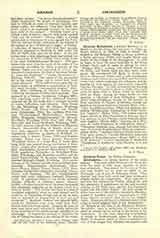

Abraham Ecchelensis, a learned Maronite, b. in Hekel, or Ecchel (hence his surname), a village on Mount Lebanon, in 1600; d. 1664 in Rome. He studied at the Maronite College in Rome, published a Syriac grammar (1628), and taught Syriac and Arabic at the College of the Propaganda. In 1630 he began to teach the same languages in the Royal College, Paris, and to assist in editing Le Jay’s “Polyglot Bible“, working with Gabriel Sionita on the Syriac and Arabic texts and their Latin translation. He contributed III Mach. in Arabic, and Ruth in Syriac and Arabic, with a Latin translation. Abraham and Gabriel soon quarrelled, and the former wrote three letters explaining this difference, and defending his work against its depreciators, especially Valerian Flavigny. In 1642 he resumed his teaching in Rome, but returned to Paris in 1645; after eight years he again went to Rome, where he remained until his death. Among his many works we may mention: a “Synopsis of Arab Philosophy” (Paris, 1641); some disciplinary canons of the Council of Nice, according to Eastern attribution, though unknown to the Latin and Greek churches (Paris, 1641); “Abr. Ecchellensis et Leon. Allatii Concordantia Nationum Christianarum Orientalium in Fidei Catholicae Dogmate” (Mainz, 1655); “De Origine nominis Papae, necnon de illius Proprietate in Romano Pontifice, adeoque de ejus Primatu contra Joannem Seldenum Anglum” (Rome, 1660); “Epistola ad J. Morinum de variis Graecorum et Orientalium ritibus;” “Chronicon Orientale nunc primum Latinitate donatum, cui Accessit Supplementum Historim oriental is” (Paris, 1653); “Catalogus librorum Chaldreorum tam Eccl. quam profanor., Auctore Hebed-Jesu Latinitate Donatus et Notis Illustratus” (Rome, 1653); a “Life of St. Anthony;” a Latin translation of Abulfath’s “Paraphrase of Apollonius’ Conic Sections, 5, 6, and 7.”
A.J. MAAS

